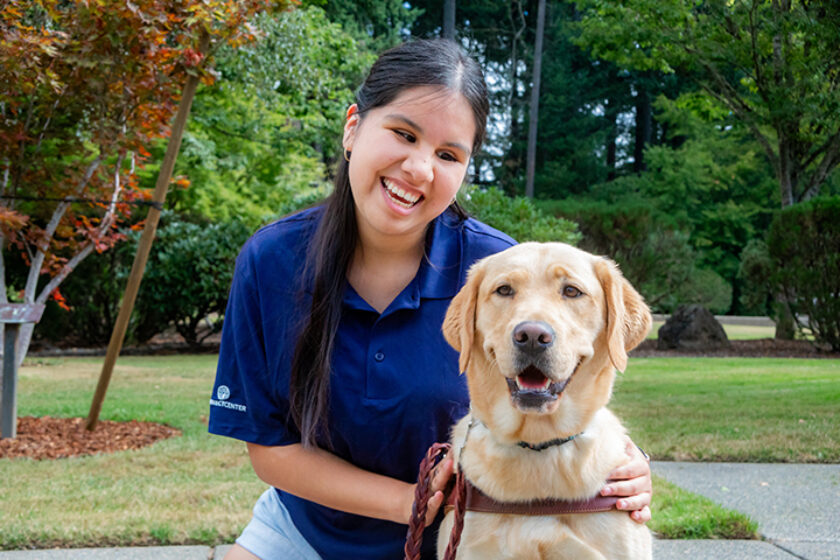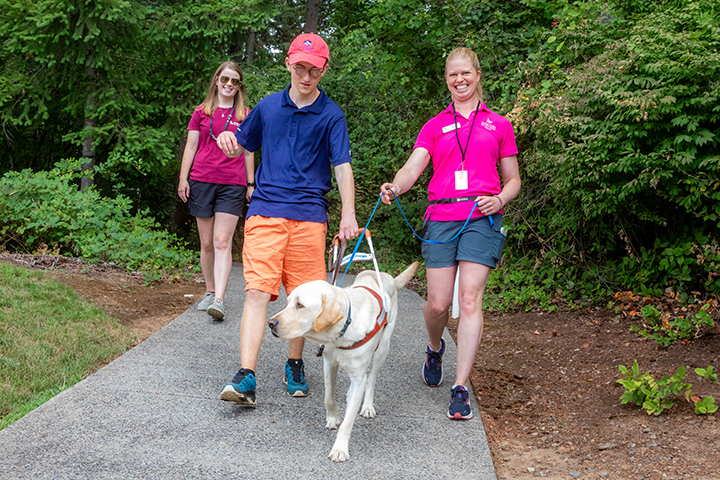Making Connections
Tuesday September 05, 2023

This summer, Guide Dogs for the Blind was excited to partner with the APH Connect Center (a division of the American Printing House for the Blind) to offer a first-in-kind program called Careers and Canine Connections. The weeklong in-residence program was created for 18-24 year-old young adults who are blind or visually impaired to explore career preparation as well as the guide dog lifestyle, and how the two might intersect. Held at a retreat facility near GDB's Oregon campus, attendees came from across the United States and participated in immersive learning experiences on topics ranging from resume-building and job interviewing skills, to dog care and grooming, with fun social activities like archery and hiking to round out the schedule.
"At this stage of these young adults' lives, some people are exploring what careers to pursue, what jobs to look into and learn about, and at the same time, how a guide dog could fit into that lifestyle," said Rabih Dow, GDB's director of outreach and advocacy. "Also, how could a guide dog be helpful in getting a job, holding a job, performing a job, and ensuring success at work? Those are the types of things this program aims to address. Also, one of the frustrating aspects of the blindness community - and disability in general - is the high level of unemployment. About 70 percent or so of people in the blindness community are unemployed. So our hope with this program is that we can support young folks heading into the workforce to give them a leg up for employment."
Richard Rueda, one of the program directors and assistant director of the APH Career Connect Center, expressed the significance of this program and why the collaboration with GDB is beneficial.
"It's important to involve young adults who are blind or have low vision into career exploration and career awareness activities, where they can learn about the options available to them in the world of work, whether it's a part-time job they're getting in school, and/or looking down the line to their future career," he said. "And what I think is unique about the partnership with Guide Dogs for the Blind and the APH Connect Center is that both organizations are well known - globally as well as nationally - and highly respected. Through this program, we are able to bring our respective strengths to the table to align and influence our future leaders."

In addition to career-related workshops and practice interviews, the program featured many guest speakers who are blind or visually impaired who have interesting careers. For the guide dog portion of the program, attendees had the opportunity to personally care for a dog during an extended period in which they were responsible for walking, grooming, feeding, and relieving the dogs. The group also visited GDB's campus where each participant got the opportunity to walk with a guide dog.
"It was my first time walking with a guide dog," said Amy Arias-Esquivias, "and I could not even begin to imagine what it would be like. The yellow Lab that was my guide expertly guided me through a winding path, and I marveled at how precise she was at following my directions. We were able to walk at a brisk speed that I could rarely accomplish with my cane. It was such an unexplainable feeling that solidified that getting a guide dog of my own was something in the future for me."
A big part of having a guide dog is the social connection that it naturally provides. Jane Flower, one of the program directors and GDB's youth outreach specialist, has a guide dog named Pilaf.
"Guide dogs bring connection - they just do," she said. "It can be very socially isolating when you are blind or visually impaired, but when people see a dog - especially a guide dog - there's just a lot of curiosity, and so people tend to want to come up and talk to you and ask you questions. And for somebody entering a work environment where oftentimes they are the only person with a visual impairment in that workspace, making those connections are going to be really important. Having a guide dog can help boost confidence in the workplace, and just out in the world as well."

Program participants came away from Careers and Canine Connections with a host of new skills, friendships, and insights.
"My big takeaway from the Careers and Canine Connections program was learning more about all of the options available to me as I plan for my future," said Charlie How. "We did learn some things about career prep - like dressing for an interview, interview skills, and learning about the Americans with Disabilities Act."
Amy agreed. "Learning about all the laws that had to do with employment and discrimination in the workplace was important," she said. "It was a topic that wasn’t very familiar to me, and I was glad that we got the chance to really dive into what our rights are as future employees."
Amy also appreciated that the program was largely staffed by people with lived experience. "One of the things that stood out to me the most when I arrived," she said, "was how most of the staff was blind or low vision. It was my first time attending a camp where the staff could relate to me and my situation and share their own experiences and advice with us. It was encouraging to see adults who had jobs they loved who also happened to be blind. As teens growing up with visual impairments, we are often told that there is a way for us to be successful and to have a good future. Actually seeing proof of it, and getting to talk with others with a variety of careers and fulfilling lives, really put it into perspective for me."
One program participant, Alana Ambrosecchia, left the program feeling set up for success in regard to her future career and guide dog goals. "I am much more prepared to go into an interview now with all of the information I've learned. I know it's not easy to go into an interview, but now I can be more confident when looking for a job," she said. "I would definitely recommend Careers and Canine Connections because it really is the best of both worlds. I know that I want to have a guide dog - I'm working toward that now, and this program just solidified that in my mind. But I didn't really think about what it would be like to have a guide dog in the workplace and what a big step that might be. But Careers and Canine Connections definitely put me the right path for both."
Visit the Youth and Young Adult Programs page of our website to learn more.

